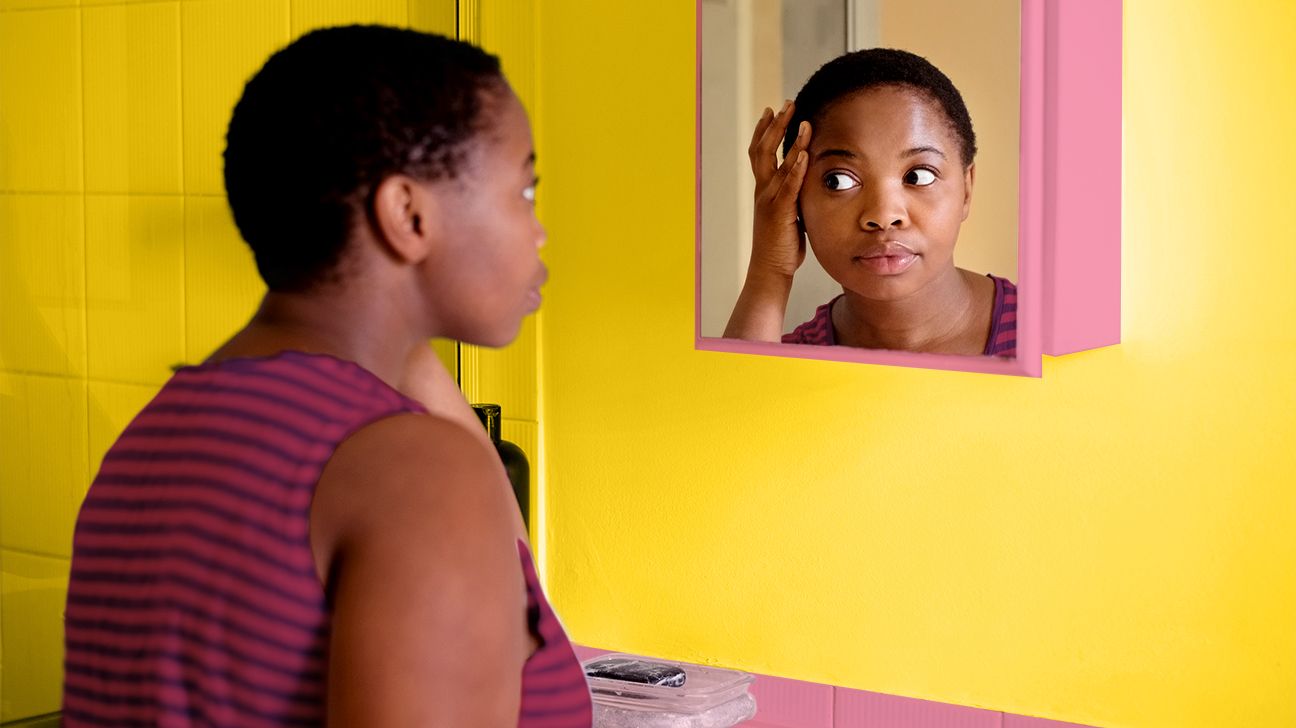Forehead breakouts happen for the same reasons as any breakout — hormones, stress, or genetics. But factors like hairspray, makeup, and clothing can also play a role.
Ahh, nothing quite like waking up to a fresh forehead breakout. But before you cut yourself some bangs to hide it (step away from the scissors!), you may want to get to the root of the prob.
Here’s what to know.
Learning about the causes of forehead acne can help you stay away from some of the common triggers.
Hormones
It’s no secret that raging hormones can contribute to acne, whether it’s during puberty, menstruation, or pregnancy. Hormone surges cause oil production to spike, which may be to blame for your forehead woes.
Stress
Acne and stress are also strongly linked, thanks to an uptick in cortisol and adrenalin.
Genes
Some peeps are more prone to oily skin and breakouts than others. Your genes may also impact how solid your immune system is when it comes to combating acne.
Hair oils and products
Watch out for hair products like hairspray, gel, and mousse. They might make your hair look great, but they could be clogging your pores, especially if they contain oil. Even shampoo and conditioner can lead to tiny acne-like bumps around the hairline.
Makeup or skincare
Makeup or skin care products can also cause breakouts on your face. But since your T-zone tends to be the oiliest, you may notice more probs around your forehead, nose, and upper cheeks.
Clothing, pillowcases, etc.
A beanie, scarf, or hat can also potentially cause irritation and breakouts, especially if your skin is sensitive or the item is unwashed. The same goes for not-so-clean pillowcases.
Touching your face
Okay, you’ve heard this one before. But it’s true! So, no face-palming, even if you really want to. 🤦♀️
Treating P. acne vulgaris on your forehead is p. much like treating it anywhere else on your face and may include:
- Cleansing. Use a cleanser at least twice daily to minimize inflammation and keep excess oil, dead skin cells, and bacteria at bay.
- Acne treatments. Acne treatments that contain benzoyl peroxide and salicylic acid can help tackle your existing breakout ASAP.
- Visit a derm. If your breakouts don’t go away after about 6 months of at-home treatment, it may be time for a professional opinion.
To avoid pimple probs down the road, here’s what to try:
- Check ingredients. Stick to oil-free or non-comedogenic skincare products.
- Skip certain styling products altogether. To prevent forehead acne caused by hair products, skip hairspray or gel in the forehead area. If you can’t avoid using them, cleanse your forehead with a washcloth after application to minimize product buildup.
- Keep your hair clean (and maybe off your face). It’s totally understandable if you don’t wanna kiss your fringe goodbye. At the very least, washing your hair regularly with an oil-free shampoo should help avoid greasy hair that can cause acne.
- Wash whatever touches your face. Wash your pillowcases every 1–2 weeks and clean your hats, glasses, and headbands on the reg to prevent bacteria buildup and other problems.
- Clean your makeup brushes. The American Academy of Dermatology (AAD) recommends washing them at least once a week with a gentle cleanser.
- Stop touching your forehead. If you have acne, then you’ve heard this one before. But listen to the pros: Try to avoid touching your face, especially if you haven’t washed your hands. The oil and dirt from your hands can clog pores in no time.
- Breathe in, breathe out. Since stress is known to contribute to acne, practicing relaxation techniques, mindfulness, or yoga may help you chill out and avoid breakouts. Regular exercise can also help you let off some steam.
Hair products, greasy hair, makeup, hats, oh my! There are a lot of things that can potentially cause forehead acne to flare up.
To prevent forehead zits, cleanse your face twice daily with a gentle cleanser and use acne treatment with benzoyl peroxide or salicylic acid. Keep your hair and skin product-free from oil, and wash your pillowcases regularly to prevent future pimples.


